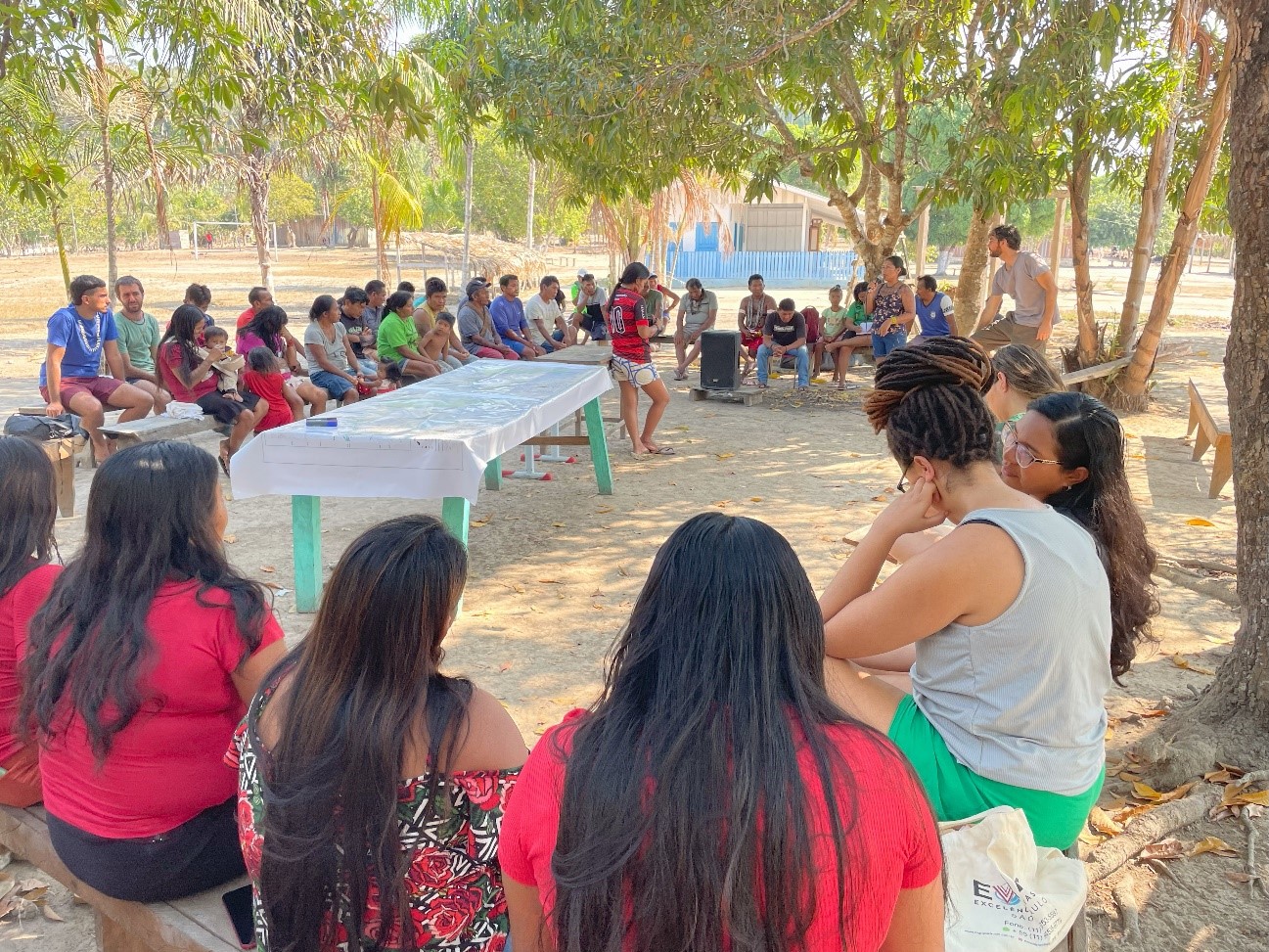
Brasília, 28/08/2024 - Promoting the approach, listening and identifying needs with communities and institutions in the Tapajós River Basin (Pará), to enable the production of a diagnosis in interface with the theme of drug policies and local development. This was the objective of the mission carried out in the Pará region by three UNODC Brazil projects, the Center for Drug Studies and Community Social Development (Cdesc), the Tapajós Project, and SAR-TI - Strengthening Early Warning Systems and Response to Environmental Crimes related to Illegal Gold Mining in Indigenous Territories.
The teams took part in technical visits to the village of Nova Trairão, near the municipality of Jacareacanga, and also to Santarém and Itaituba, holding meetings with local authorities and interviewing indigenous leaders from the region, social and health professionals and representatives of organised civil society, with institutions such as the Pastoral Land Commission (CPT), the Federal Public Prosecutor's Office, the Health and Happiness Project, the Guatoc and Rio Tapajós Special Indigenous Health Districts (DSEIs), the Tapajós Arapiuns Indigenous Council (CITA), the Pariri Indigenous Association and the Belterra Association of Rural Women Workers (Amabela).
Within the framework of CDESC, the mission was carried out in collaboration with the National Strategy for Mitigating and Repairing the Impacts of Drug Trafficking on Indigenous Territories and Populations, of the National Secretariat for Drug Policy and Asset Management of the Ministry of Justice and Public Security (Senad/MJSP), seeking to provide support for its actions.
“Through the interviews, dialogues and meetings held, we were able to gather preliminary information and subsidies to compose a general mapping of the impacts of problematic use of alcohol and other drugs in the region. Among the main demands presented to offer alternatives and solutions for local development is the strengthening of some existing production chains, such as flour, for example,” explained Bárbara Souto, coordinator of CDESC.
Actions
At the meeting with leaders of the Munduruku people in the village of Nova Trairão, with which the Tapajós Project has been building a partnership since 2023, progress was made on two activities co-produced locally with the community. One of them is the architectural redesign of the Formation and Resistance Center and other collective structures in the village, which will host assemblies, training, meetings and other community decision-making spaces, as well as hosting georeferencing and territorial monitoring equipment.
The Tapajós Project also provides for the implementation of direct support for alternative development initiatives for sustainable value chains that function as economic alternatives to mining, with the aim of reducing the incidence of illegal mining and preventing crimes related to the activity - among them preventing the indigenous population from being vulnerable to human trafficking for slave labour and sexual exploitation. At the meeting, the leaders presented alternatives for viable production chains, ways of structuring them locally and the need for ongoing training.
“We left this mission certain that we have a lot of work and possibilities for a positive impact in one of the regions that presents challenges in terms of crime, illegal mining and violence in the heart of the Amazon,” said Marcela Ulhoa, coordinator of the Tapajós Project.
In the context of SAR-TI, project representatives exchanged experiences with the Munduruku on autonomous surveillance and territorial protection. With the aim of strengthening the Mundururku people's autonomous surveillance, UNODC, through SAR-TI, donated GPS devices to help with this type of activity. In addition, the possible physical and operational structuring of a room dedicated to action for the protection of the territory was discussed, as well as the creation of a plan to promote exchanges between the Munduruku and other indigenous associations and organizations, such as the Indigenous Council of Roraima (CIR).
“This mission gave us the opportunity to find out how the Munduruku people carry out their autonomous surveillance and to hear how UNODC can contribute to strengthening initiatives that support the expansion and improvement of these activities, which are essential for Munduruku territorial protection,” said Elisangela Sousa, manager of the SAR-TI Project.
Get to know the projects
The Center for Drug Studies and Community Social Development (CDESC) is the result of a partnership among the National Secretariat for Drug Policy and Asset Management of the Ministry of Justice and Public Security (SENAD/MJSP), the United Nations Development Program (UNDP) and the United Nations Office on Drugs and Crime (UNODC). The Center's actions seek integrated strategies to guarantee human rights in both urban and rural areas, with special attention to urban peripheries and indigenous peoples and the most vulnerable groups.
Tapajós is a project implemented since 2021 by UNODC Brazil, as a depository of the UN Human Trafficking Protocol, with funding from the US State Department's Office to Monitor and Combat Trafficking in Persons (J-TIP). It aims to identify the prevalence of human trafficking and slave labour in the gold mining sector in the Tapajós River basin, in the state of Pará, and to implement evidence-based interventions to reduce and prevent these crimes in the region.
The SAR-TI project is supported by the Italian Ministry of Foreign Affairs and International Cooperation (MAECI). The project aims to support and foster the articulation of indigenous associations and organizations, government institutions and civil society for the structuring, strengthening and integration of mechanisms for preparation, monitoring, early warning and response to environmental and other crimes in indigenous territories, with a focus on areas affected by illegal gold mining in the Amazon.